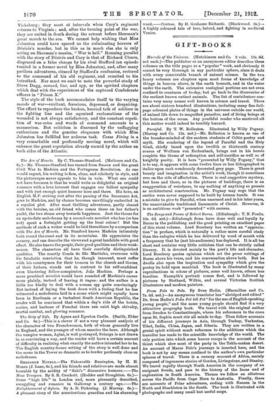The Ace of Hearts. By C. Thomas-Stanford. (Methuen and Co.
6a.)—Mr. Thomas-Stanford has turned from Sussex and the great Civil War to Madeira and the Portuguese Revolution. As one would expect, his writing is firm, clear, and scholarly in style, and the picturesque never appeals to him in vain. What one could not have foreseen is that he would write so delightful an original romance with a love interest that engages our fullest sympathy and with plat enough quiet humour here and there. His hero, an English M.P. seeking rest after the passing of the Insurance Act, goes to Madeira, and by chance becomes unwillingly embroiled in a royalist plot. After most thrilling adventures, partly shared with the heroine, an old friend who comes there on her father's yacht, the two steam away towards happiness. Just the theme for an up-to-date melodrama by a second-rate novelist who has (or has not) spent a fortnight getting up the local colour ! But the methods of such a writer would be laid threadbare by a comparison with The Ace of Hearts. Mr. Stanford knows Madeira intimately both round the coast and in its mountains. He appreciates the scenery, and can describe the views and a great landslide with good effect. He also knows the people, their good qualities and their weak- nesses. The characters all have their carefully distinguished qualities. The courtly Conde de Sgo Martinho, overcome with his fatalistic conviction that he, though innocent, must suffer with his countrymen for their treason to the church and throne., of their fathers, stands out in contrast to his self-confident even blustering fellow-conspirator, Jogo Machico. Perhaps a more practised novelist would have rounded off Machico's career more plainly, instead of leaving it vague : and the author is a little too kindly to deal with a woman spy quite convincingly But instead of laying the book down with a feeling that he has witnessed a melodrama laid in a scene which might equally have been in Ruritania or a turbulent South American Republic. the reader will be convinced that within a day's ride of the hotels, casino, and harbour of Funchal there can exist high chivalry, mortal combat, and glowing romance.
The Grip of Life. By Agnes and Egerton Castle. (Smith, Elder and Co. 6s.)—This is a clever if not a very pleasant analysis of the character of two Frenchwomen, both of whom generally live in England, and the younger of whom marries the hero. Although the vampire woman, Aglaa, is well portrayed, Solange is not drawn in so convincing a way, and the reader will have a certain amount of difficulty in realizing what exactly the author intended her to be. The English country-house setting of the story is well done and the scene in the Tower so dramatic as to border perilously close on melodrama.










































 Previous page
Previous page